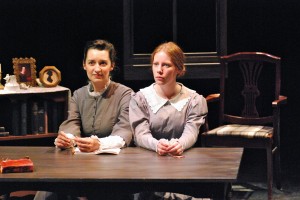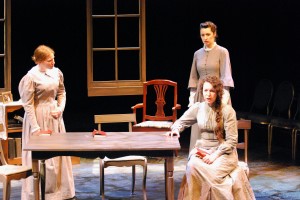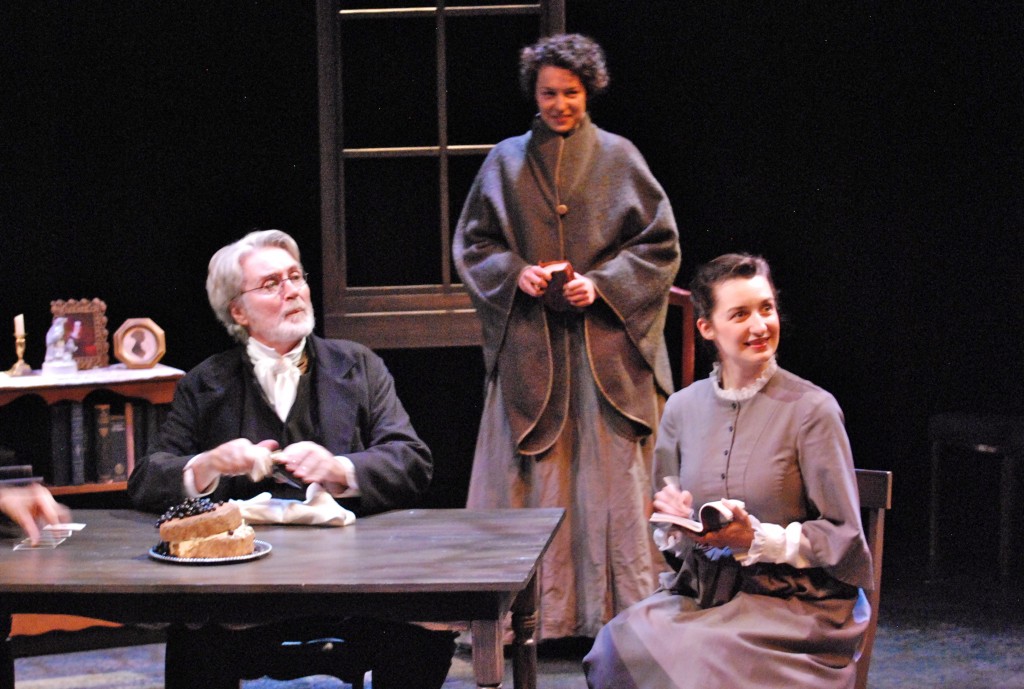
Credit: Nancy Caldwell
At Jericho Arts Centre until June 30
604-224-8007/www.unitedplayers.com
Posted on June 8, 2013
The Observer theatre critic Claire Brennan wrote on September 17, 2011: “The writer Blake Morrison first described this notion as “bonkers” when Susannah Clapp, this paper’s senior theatre critic, suggested it to him 10 years ago.” This ‘notion’ was to explore the lives of the Brontë sisters through the text of Anton Chekhov’s Three Sisters. Nine years later, Barrie Rutter, the artistic director of Northern Broadsides in Halifax, West Yorkshire, England, decided it would be perfect for Morrison’s sixth collaboration with Broadsides.
But it does feel bonkers hearing Anne (Victoria Lyons) spouting almost the same words as Chekhov’s Irena: “Yes, we must just go on working . . . I’ll go on working and working”. Or Lydia Robinson (Helen Martin) in We Are Three Sisters, complaining about Tabby (Emma Middleton), the Brontë’s maid, in almost exactly the same derisive terms as Natasha complains of Anfisa. There’s a drunken doctor in both as well as a ne’er do well brother in love with a coarse, domineering woman: Natasha – vulgar but, at least, single; Lydia – vulgar and very much already married.
And obviously, Chekhov’s sisters’ fervent wish to get to Moscow becomes Morrison’s sisters’ desire to get to London.
For those up on their Chekhov it’s easy to get into the head game of ‘Spot the Chekhov’. And that’s not a good thing; if you’re playing that game, you’re not fully engaged.
Nevertheless, We Are Three Sisters is an entertaining exploration of the lives of Anne, Charlotte and Emily Brontë and their brother Branwell. It’s far from gloomy and suggests that, for their time, they were strong-willed, strong-minded and talented women in a period when to be a woman writer was, as their patronizing father (Sean Allan) declared, never to be published. “Books cannot be the business of a woman’s life,” he pontificated.

MariaLuisa Alvarez (front)
Credit: Nancy Caldwell
In the play, it’s Anne’s twenty-fifth birthday; Charlotte is not yet thirty, Emily is about twenty-eight. And while they write about love, what do they know of love? (At this point, Kate and Anna McGarrigle’s song, “Love Over and Over” with its reference to “Emily, Anne and Charlotte” and “What did they know/What could anyone know/About Love” rang in my head.)
Carolyn Rapanos’ set is simply-stated elegance, beautifully lit by Graham Ockley. Neil Griffiths’ sound design is an unobtrusive and lovely score for piano.
On opening night, United Players artistic director Andrée Karas made a point of reminding us that everyone involved in the production is a volunteer and all but the director, Sandra Ferens, and two of the actors, Douglas Abel and Allan, are non-professionals. The quality of many of performances is far from amateur, however.
Like Chekhov’s Three Sisters, it’s an ensemble piece but, as in the brilliant Russian play, one sister stands out. Here it is Charlotte who is effectively foregrounded by Olesia Shewchuk who conveys all of Charlotte’s wit and fire. MariaLuis Alvarez is Emily, the most withdrawn and secretive of the sisters while Victoria Lyons is a shy, blushing Anne, relentlessly pursued by the old doctor (Abel) as well as the flirtatious young curate (Nick Preston).
Helen Martin, in a green, off-the-shoulder gown (by costumer Elliott Squires), is the nasty Mrs. Robinson. (And here’s another connection: surely playwright Morrison borrowed “Mrs. Robinson” from The Graduate: older woman, younger man.)
Jordon Navaratil, as heavy-drinking Branwell, comes on strong in Act 2.
The frequent echoes of Chekhov are weird but I was otherwise drawn in and the production is excellent.
As for whether Chekhov drew inspiration from Mrs. Elizabeth Gaskell’s 1857 biography of Charlotte Brontë (commissioned by Charlotte’s father), a Yorkshire theatre company might love to think so. It makes a good story: Charlotte, Emily and Anne as Chekhov’s Three Sisters. We know Chekhov read Cervantes and Schopenhauer. But did he read Gaskell?

Credit: Nancy Caldwell

